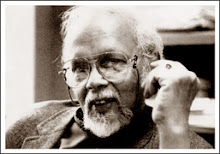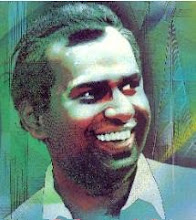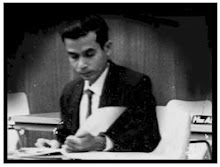Prof. Ashley Halpe, the doyen of English language education in Sri Lanka, marked 50 years of service as an academic here and abroad. In retrospect, his corpus and thousands of students he produced were only a part of the rich legacy of Prof. Halpe. The multi-faceted personality of his spreads into many territories such as paintings, poetry and a remarkable works of translations.

 Perhaps an important facet of Prof. Ashley Halpe's character is the writer, dramatist, painter and poet in him. His burgeoning creativity has found avenues of expression in diverse media such as in paintings, and creative writing.
Perhaps an important facet of Prof. Ashley Halpe's character is the writer, dramatist, painter and poet in him. His burgeoning creativity has found avenues of expression in diverse media such as in paintings, and creative writing.
His rich and insightful poetry shed light on a vast terrain of human activities and social upheavals and cover wide range of subjects. He casts his poetic net upon the vast tapestry of social fabric bringing the everyday experiences as well as social upheavals under its scope.
Poet of distinction
For instance, the poem titled 'April 1971' which has been on the 1971 youth uprising, epitomizes the brutal crackdown of the insurgency.
'Young bodies tangled in monsoon scrub or rotting in river shallows, awaiting the kind impartial fish, and those not dead - numb, splotched faces, souls ravaged by all their miseries and defeats"
In another poem titled 'Memoranda of July', Prof Halpe revisits 'Black July' perhaps in a more creative manner.
"About sacks on shoulders in orangeness About hands slipping from
Bloodstained branches Welcome, torturers and redeemers".
Here, it is obvious that unlike most of the academics, Prof. Halpe is always sensitive to developments in political and social spheres. The 'Black July' would have been a devastating incident for gentle professor. It is this profound shock that he recreates in the above stanza.
Perceptive translator
As a translator, Prof. Halpe is marked for his economy of expression and attempt he made to stick to the original zest of the work. This characteristic is amply manifested in most of his translations and particularly in his translation of Martin Wickremasinghe's ' Madol Doova'. Although it is not possible for one to translate the zest of the original work from one language to another, Prof. Halpe's English translation of ' Madol Doova' is perhaps, a mirror image of the original work in Sinhalese.
In the mass of his translations, Sigiri poems would have been a gigantic academic exercise. However, he has succeeded in the endeavour, resulting in production of poems in English. The Way of the Lotus, and Madol Doova, translations of Martin Wickramasinghe's seminal works have been hailed as one of the best translations available in English of Wickramasinghe's work.
Madol Doova has been a prescribed textbook in the Ordinary Level English Literature syllabus.
Outstanding academic
In a paper, presented to be published in Singapore in a work on Sri Lankan Literature in English edited by Prof. Thiru Kandiah, Prof. Halpe observes the evolution of Sri Lankan drama and theatre in English which goes back to rudimentary early productions by Ceylon Amateur Dramatic Club and staging of plays of European origin by English Schools established in the middle of 19th century and the Norman School which, subsequently, became the Government Teachers' College.
Prof. Halpe discusses the influence that English theatre on Sinhala theatre of the day, especially, in the context of revival of drama and theatre in the University of Peradeniya. The movement was spearheaded by Prof. E.F.C Ludowyk and Prof. Ediriweera Sarachchandra.
E.F.C Ludowyk produced 'He comes from Jaffna', a brilliant adaptation with distinct Sri Lankan characteristics, situations and language.
Researcher par excellence
Prof. Halpe's paper titled 'Sri Lankan Literature in English' which he contributed to the publication 'Sri Lanka's Development since Independence: Socio-Economic Perspectives and Analyses' edited by Weligamage D.Lakshman and Clement A. Tisdell and Published by Nova Science Publishers Inc., Huntington, New York, shows the academic excellence and shedding insights into subject matter.
In his essays, Prof. Halpe treats the subject at hand in its entirety and digging into the very bedrock in the formation of Sri Lankan Literature in English, examining the limited corpus of work in English penned by Sri Lankans during the latter part of British occupation in Sri Lanka.
Inter alia, he observes that English was exclusively used in the state affairs in the post-colonial Sri Lanka. However, insignificant number of Literature in English was produced in the period.
Among other things, Prof. Halpe observes that though English had been used exclusively in the affairs of the state following the departure of British from Sri Lankan shores, very little Sri Lankan Literature in English was produced during the period.
At first, Sri Lankan writers in English were not able to express 'native sensibility' in their adopted tongue. However, he pointed out, in the latter stages, Sri Lankan Literature in English has evolved in scope, devising a diction which is capable of expressing authentic Sri Lankan experiences.
"Lankan Literature in English developed strength and sophistication and greatly extended its range as its practitioners arrived at 'a sense of real things'. Viewed another way, it is when this 'sense' penetrated this literature that it became for readers , particularly Lankan readers, materially integrated with their reality and , at least, potentially, a powerful agent of critical revaluation in a period of confusion and dismay" states Prof. Halpe in capturing the essential characteristics of Sri Lankan English."Interestingly, this arrival of prose comedy in English and on the Lankan stage chimed with the arrival of the same dramatic type in Sinhala. This is not surprising, since Ludowyk was associated with Ediriweera Sarachchandra and the members of the 'Sinhala Ranga Sabha' in the search for a 'modern' form for Sinhala drama.
The group has decided that a form could be evolved by beginning with adaptations of European comedies and the Ludowyk/Sarachchandra Kapuva Kapothi, an adaptation of Gogol's Marriage, had been a memorable result" comments Prof. Halpe on the early stage of Sri Lankan theatre in English.He pointed out that by now several playwrights have carved out niche for themselves in Sri Lankan theatre in English and the contemporary productions are rich in variety and their orientations.
"Sri Lankan theatre and drama in English today is a congeries of forms, styles and tendencies.
Thus Jehan Aloysius uses the masked dancers of ritual and Kolam drama to express one aspect of his meaning in The Ritual and the form of the music in Rag, and Ruwanthie de Chickera built a play around an immobilised protagonist in The Middle of Silence, experimented with time in Two Times Two and with forum theatre in Checkpoint. "states Prof. Halpe of the stature and nature of Sri Lankan contemporary drama and theatre in English.
Although one may not be able to exhaust the vast body of works authored by Prof. Ashley Halpe within a limited space, I believe that the little citations I made are suffice to taste the genius on the part of the author and the ground that his studies and numerous academic papers cover and their lasting contribution to the body of knowledge in specialised areas.
At the Literature conference "Towards Twenty First Century; Cross Cultural Identities in the Contemporary Sri Lankan and British Writing" organised by the British Council in 1999, when Prof.Ashley Halpe and Aparna Halpe presented their papers, victims of circumstances intimated to me of how Prof. Halpe's benevolent intervention, once enabled talented students, currently outstanding academics to complete their post graduate studies when a Satan in academic garb blocked their passage to excellence.
In fact, one salvaged student is now fully-fledged Professor attached to a prestigious university while the other is an academic and writer teaching at a leading university abroad. They are also insightful researchers and critics in the wide spectrum of language studies and literature.
Prof. Ashley Halpe remains as an intellectual beacon to dispel the darkness of ignorance. He bears the bright torch left behind by generations of academics including his guru Prof. E.F.C Ludowyk.




































No comments:
Post a Comment